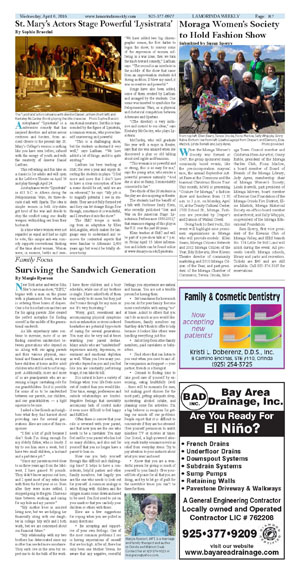|
|
Published April 6th, 2016
|
Family Focus
|
| Surviving the Sandwich Generation |
| By Margie Ryerson
|
 |
| Margie Ryerson, MFT, is a marriage and family therapist and author in Orinda and Walnut Creek. Contact her at 925-376-9323 or margierye@yahoo.com. |
New York actor and writer John Jiler's one-man show, "RIPE," begins with a man on the phone with a pharmacist, from whom he is ordering three boxes of diapers. One is for his infant son and two are for his aging parents. Jiler created the perfect metaphor for finding oneself in the middle of the generational sandwich.
 As life expectancy rates continue to increase, more of us are finding ourselves sandwiched between generations who depend on us. Along with our aging parents and their various physical, emotional and financial needs, we may have children at home and/or adult children who still look to us for support. Additionally, more and more of us are grandparents who are assuming a larger caretaking role for our grandchildren. So it is possible for some of us to be sandwiched between our parents, our children, and our grandchildren - a tight squeeze to be sure.
As life expectancy rates continue to increase, more of us are finding ourselves sandwiched between generations who depend on us. Along with our aging parents and their various physical, emotional and financial needs, we may have children at home and/or adult children who still look to us for support. Additionally, more and more of us are grandparents who are assuming a larger caretaking role for our grandchildren. So it is possible for some of us to be sandwiched between our parents, our children, and our grandchildren - a tight squeeze to be sure.
 I asked a few friends and neighbors what they find hardest about providing care for several generations. Here are some of their responses:
I asked a few friends and neighbors what they find hardest about providing care for several generations. Here are some of their responses:
 "I feel a lot of guilt because I don't think I'm doing enough for my elderly father, who is lonely. I try to see him once a week, but I have two small children, a husband and a part-time job."
"I feel a lot of guilt because I don't think I'm doing enough for my elderly father, who is lonely. I try to see him once a week, but I have two small children, a husband and a part-time job."
 "Since my parents moved close to us three years ago from the Midwest, I have gained 30 pounds. They didn't know anyone out here, and I spent most of my extra time with them the first year or so. Even after they were more settled, I stopped going to the gym. I have no time between working and caring for my kids and my parents."
"Since my parents moved close to us three years ago from the Midwest, I have gained 30 pounds. They didn't know anyone out here, and I spent most of my extra time with them the first year or so. Even after they were more settled, I stopped going to the gym. I have no time between working and caring for my kids and my parents."
 "My mother lives in assisted living now, but we are helping her financially along with our daughter in college. My wife and I both work, but we are concerned about our financial future."
"My mother lives in assisted living now, but we are helping her financially along with our daughter in college. My wife and I both work, but we are concerned about our financial future."
 "My relationship with my two brothers has deteriorated since my mother has needed more assistance. They each live in the area but expect me to do the bulk of the work. I have three children and a busy schedule, while one of my brothers is single. I have asked both of them very nicely to do more, but they just don't come through for my mom or me. It's very frustrating."
"My relationship with my two brothers has deteriorated since my mother has needed more assistance. They each live in the area but expect me to do the bulk of the work. I have three children and a busy schedule, while one of my brothers is single. I have asked both of them very nicely to do more, but they just don't come through for my mom or me. It's very frustrating."
 Worry, guilt, resentment and accompanying physical symptoms such as exhaustion or stress-induced headaches are potential byproducts of caring for several generations. You may also be very sad at times watching your parent decline. Many adults who are "sandwiched" experience anxiety, depression, resentment and emotional depletion as well. When you love many people who depend on you and you feel like you are constantly performing triage, it can take its toll.
Worry, guilt, resentment and accompanying physical symptoms such as exhaustion or stress-induced headaches are potential byproducts of caring for several generations. You may also be very sad at times watching your parent decline. Many adults who are "sandwiched" experience anxiety, depression, resentment and emotional depletion as well. When you love many people who depend on you and you feel like you are constantly performing triage, it can take its toll.
 It is natural to have a variety of feelings when your life feels more out of control than you would like. Your time, energy, preferences and outside relationships are limited. Negative feelings that inevitably accompany lack of control make it even more difficult to feel happy and fulfilled.
It is natural to have a variety of feelings when your life feels more out of control than you would like. Your time, energy, preferences and outside relationships are limited. Negative feelings that inevitably accompany lack of control make it even more difficult to feel happy and fulfilled.
 Often there is sorrow that your role is reversed with your parent, and that now you are the one who needs to be a caretaker. You may feel sad for your parent who has lost so many abilities, and also sad for yourself that you no longer have a parent to lean on.
Often there is sorrow that your role is reversed with your parent, and that now you are the one who needs to be a caretaker. You may feel sad for your parent who has lost so many abilities, and also sad for yourself that you no longer have a parent to lean on.
 How can you help yourself through this difficult and challenging time? It helps to have a considerate, helpful partner and other family members, but largely you are the one who needs to look out for yourself. A common analogy is when flying with children and the oxygen masks come down and need to be used. You first need to put on your mask so that you can help your children or others with theirs.
How can you help yourself through this difficult and challenging time? It helps to have a considerate, helpful partner and other family members, but largely you are the one who needs to look out for yourself. A common analogy is when flying with children and the oxygen masks come down and need to be used. You first need to put on your mask so that you can help your children or others with theirs.
 Here are a few suggestions for coping when you are pulled in many directions:
Here are a few suggestions for coping when you are pulled in many directions:
 � Be accepting and supportive of your own feelings. One of the most common problems I see is having expectations of oneself that are too high. After all, there has only been one Mother Teresa. Be aware that any negative, resentful feelings you experience are natural and human. You are not a terrible person for having them.
� Be accepting and supportive of your own feelings. One of the most common problems I see is having expectations of oneself that are too high. After all, there has only been one Mother Teresa. Be aware that any negative, resentful feelings you experience are natural and human. You are not a terrible person for having them.
 � Set boundaries for how much you can do for your family. Become more comfortable with saying "no" at times. Admit to others that you can't do as much as you would like. Sometimes, family members say that they didn't think to offer to help because it looked like others were handling everything just fine.
� Set boundaries for how much you can do for your family. Become more comfortable with saying "no" at times. Admit to others that you can't do as much as you would like. Sometimes, family members say that they didn't think to offer to help because it looked like others were handling everything just fine.
 � Enlist help from other family members, paid caretakers or babysitters.
� Enlist help from other family members, paid caretakers or babysitters.
 � Find others that can listen to you vent when you need to and offer compassion and support - your partner, friends or a therapist.
� Find others that can listen to you vent when you need to and offer compassion and support - your partner, friends or a therapist.
 � Commit to finding time to take good care of yourself by exercising, eating healthfully (well ... there will be moments for sure, but making good choices for the most part), getting adequate sleep, moderating alcohol intake, and planning some fun activities. I'm a big believer in escapism for getting our minds off our problems. People report that it is difficult to concentrate if they are too stressed. Give yourself permission to watch mindless TV or movies at times. One friend, a high-powered attorney, reads trashy romance novels as relief from everyday stress. Try to pay attention to your instincts about what you want and need.
� Commit to finding time to take good care of yourself by exercising, eating healthfully (well ... there will be moments for sure, but making good choices for the most part), getting adequate sleep, moderating alcohol intake, and planning some fun activities. I'm a big believer in escapism for getting our minds off our problems. People report that it is difficult to concentrate if they are too stressed. Give yourself permission to watch mindless TV or movies at times. One friend, a high-powered attorney, reads trashy romance novels as relief from everyday stress. Try to pay attention to your instincts about what you want and need.
 � Know that you are a wonderful person for giving so much of yourself to your family. Give yourself lots of praise for all that you are doing, and try to let go of guilt for the inevitable times you can't be there for them.
� Know that you are a wonderful person for giving so much of yourself to your family. Give yourself lots of praise for all that you are doing, and try to let go of guilt for the inevitable times you can't be there for them.


|
|
|
|
|
|
|
|
|
| |
|
|
|
|



